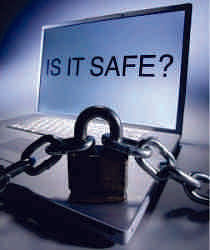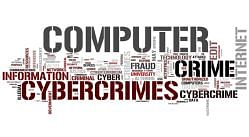Law Watch
Combating cyber crimes
Md. Ashraful Alam
 The 21st Century, the era of information, science and technology has led us to live in a cyber world. Now, the world is in the optimal beneficial level of technology throw e-communication in business, education and view exchange crossing the global boundary. But this blessing has brought some unavoidable evil which has threatened the regime of safety e-communication. The issue became a global talk after the incidents of WikiLeaks and one step forward after the Skype incident in Bangladesh. None can deny that e-communication system has unimaginable advantages in human life. But one should not forget that there are many major risks also involved with them. Some of the most common and dangerous of these are: electronic fraud especially in the financial sector, identity theft, illicit use of valuable information, hacking or cracking, cyber-stalking, distribution of pirated software, terrorism and interference with sophisticated high level national security measures, immoral activities, defamation and harassment which affect individuals at large. All these are collectively termed as cyber crime. Cyber crime in Bangladesh is nothing new. From the very beginning of cyber era in Bangladesh, some people started to take advantage of cyber facility in a wrong way. And the rate of cyber crime is ever increasing in Bangladesh.
The 21st Century, the era of information, science and technology has led us to live in a cyber world. Now, the world is in the optimal beneficial level of technology throw e-communication in business, education and view exchange crossing the global boundary. But this blessing has brought some unavoidable evil which has threatened the regime of safety e-communication. The issue became a global talk after the incidents of WikiLeaks and one step forward after the Skype incident in Bangladesh. None can deny that e-communication system has unimaginable advantages in human life. But one should not forget that there are many major risks also involved with them. Some of the most common and dangerous of these are: electronic fraud especially in the financial sector, identity theft, illicit use of valuable information, hacking or cracking, cyber-stalking, distribution of pirated software, terrorism and interference with sophisticated high level national security measures, immoral activities, defamation and harassment which affect individuals at large. All these are collectively termed as cyber crime. Cyber crime in Bangladesh is nothing new. From the very beginning of cyber era in Bangladesh, some people started to take advantage of cyber facility in a wrong way. And the rate of cyber crime is ever increasing in Bangladesh.
It is assumed that hacking would top the list as a form of cyber crime. Generally hacking is an unauthorized access to computer systems or networks. Hacking refers to the re-configuring or re-programming of a system to function in ways not facilitated by the owner, administrator or designer. The terms “hack” and “hacking” are also used to refer to a modification of a program or device to give the user access to features that were otherwise unavailable, such as DIY circuit bending. It is from this usage that the term “hacking” is often incorrectly used to refer to more nefarious criminal uses such as identity theft, credit card fraud or other actions categorized as computer crime there being a distinction between security breaking and hacking, a better term for security breaking would be “cracking”. Hacking is shown as a common threat not only to personal and confidential communication but also to national security. In Bangladesh, 4 students of a private technology institute hacked the RAB web site. On 23 June 2009 RAB arrested JMB IT chief Rajib who used the internet as an engine of resources to make explosives to use in terrorism activities as he confessed that “I download information on explosives from internet, translate those in Bengali and send those to Mizan through Bashar (The Daily Star),” which is a serious concern for our national security.
 Bangladesh needs an effective and uniform framework to control the misuse of cyber net. Therefore, an effective cyber law can play a vital role in suppressing cyber crimes to ensure a fair internet world. The government has shown a very positive approach by formulating some policies and enacting some laws as safeguards for cyber victims. Namely, the National ICT Policy, Cyber Law, Information Technology (Electronic Transactions) Act (ITETA), 2000. More recently enacted Information and Communication Technology Act (ICTA) 2006 to facilitate electronic commerce and to encourage growth and development of information technology and brought the cyber criminal within the ambit of criminal jurisdiction. The Pornography Act, 2012 is also a significant development on the issue. Some commentators stress the importance of making the law more stringent to prevent widespread cyber crime.
Bangladesh needs an effective and uniform framework to control the misuse of cyber net. Therefore, an effective cyber law can play a vital role in suppressing cyber crimes to ensure a fair internet world. The government has shown a very positive approach by formulating some policies and enacting some laws as safeguards for cyber victims. Namely, the National ICT Policy, Cyber Law, Information Technology (Electronic Transactions) Act (ITETA), 2000. More recently enacted Information and Communication Technology Act (ICTA) 2006 to facilitate electronic commerce and to encourage growth and development of information technology and brought the cyber criminal within the ambit of criminal jurisdiction. The Pornography Act, 2012 is also a significant development on the issue. Some commentators stress the importance of making the law more stringent to prevent widespread cyber crime.
Curbing cyber crime has become a big challenge for us as it is spreading fast among the youths. Besides enacting laws to curb cyber crime and pornography, we have to procure equipment to detect and identify people involved in cyber crime and bring them to book. We need for trained police and members of the law enforcement agencies on curbing cyber crimes and pornography. The RAB DG recently opined that we need to formulate an integrated policy to curb the cyber crime. We have some equipment for identifying the criminals, but we lack legal coverage to punish the criminals. RAB had arrested a number of people in last 18 months for their alleged involvement in criminal activities but adjudication was very technical which is beyond the ordinary capacity of court. Special court is necessary to adjudicate such type of technical crime. Bangladesh government may formulate a baseline security procedures policy outlining the minimum requirements which must be met by agencies regarding information security and may also develop a special analysis site which will be observed and will provide real-time monitoring of cyber activities. Cyber incident response unit and 'a cyber crime investigation cell' may be built within law enforcement authority to fight against cyber crime successfully.
Moreover, to keep the national security uninterrupted and avoid hacking, web servers running public sites must be physically separate protected from internal corporate network and web site owners should watch traffic and check any inconsistency on the site by installing host-based intrusion detection devices. Law enforcement authority must monitor cafes' and users' activities imposing restriction on some websites and users (under18) requiring bar code/password for use and make the users aware of the possible consequences of using certain sites. Government agencies, NGOs, media and server agencies may come forward to build awareness among the general internet users particularly more vulnerable victims. Educational institutions may include curriculum comprise with moral and social ethics and users' code of conduct for the future IT fellows not to use the technology in a morally reprehensible manner.
Cyber crime is of trans-boundary nature. Only single attempt by Bangladesh government may not be suitable enough in inter-country linked cyber crime. Therefore, Bangladesh needs to make collaboration and co-operation with other countries. Bangladesh being a member of INTERPOL may seek help to secure the punishment of net criminals regardless of territory using INTERPOL's global secure police communications system. It may access to international document relating to combat cyber crime. Finally, it may be concluded that the collective effort of government, aware people and international community may protect cyber crime and ensure the maximum benefit of science and technology. Both preventive and punitive approach in controlling and punishing cyber criminal may be the successful key to combat cyber crime and to ensure a safety e-communication.
The writer is Senior Lecturer, Department of Law, Uttara University.